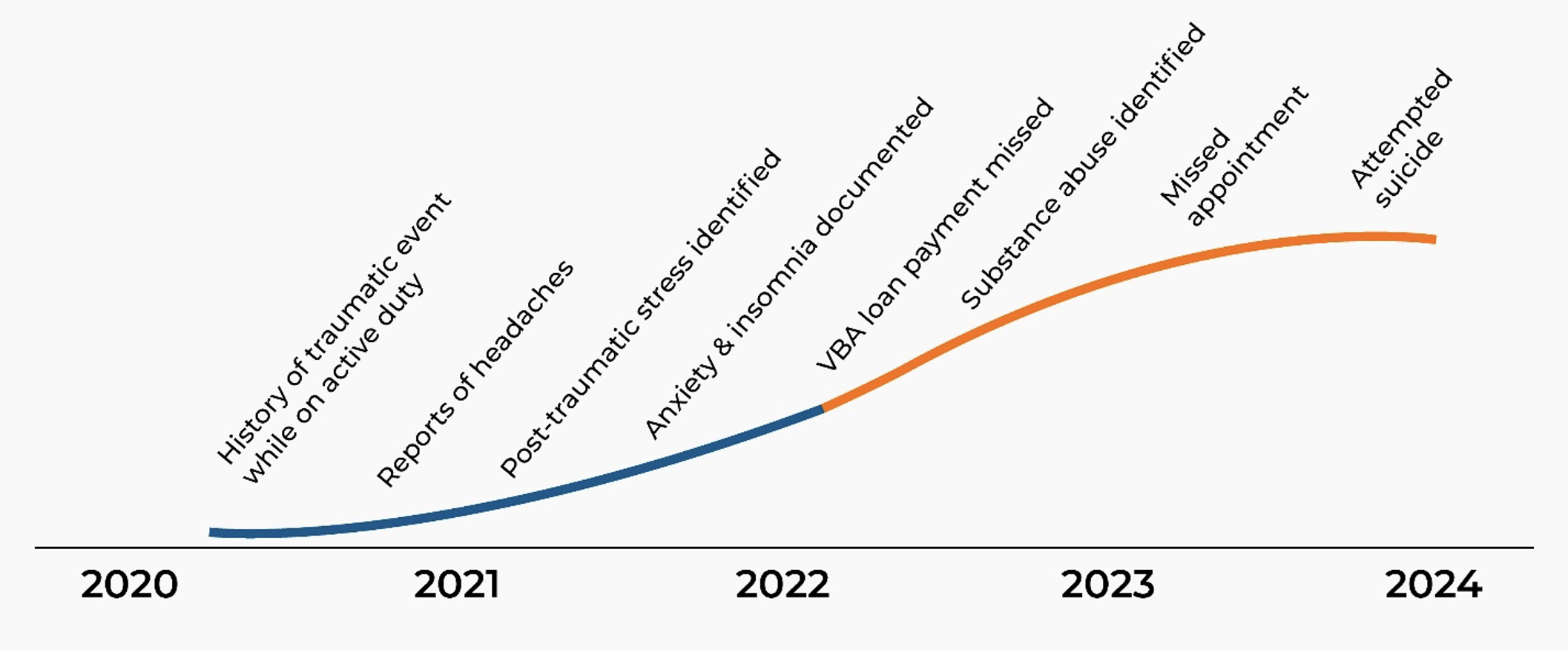sponsor content What's this?
Suicide risk insights: An innovative approach to suicide prevention

Presented by

By Amanda Bonser, Charles Kozel and Dr. Dan Smith
Depression, anxiety, self-harm, and suicide are urgent, ongoing public health issues. While much work has been done in communities and healthcare systems to mitigate these concerns, the complexity of mental health treatment makes advancements challenging.
In the broader healthcare arena, organizations are managing a deluge of patient data but, in many cases, lack the technology, staff resources, or budget to make it actionable enough to enable more patient-centered, holistic care.
Further, existing suicide risk identification and prevention programs tend to apply a binary methodology to analyzing their populations by simply categorizing individuals as “at risk” or “not at risk”. With this approach, by the time an individual is categorized “at risk,” they are often already experiencing a crisis. A more nuanced scale is required for healthcare practitioners to step in at an earlier stage, when it is more likely to produce positive outcomes.
This is where, with the right people, processes, and technology in place, new possibilities emerge for a distinctive approach to understanding and predicting risk, paving the way to building healthier communities across the globe.
Predictive analytics offer a new approach to risk identification
Emerging technologies allow for the architecture of innovative, predictive data models that enable early identification, timely intervention, and ongoing support for various disease states, including suicide risk. Instead of relying on binary risk identification, these models allow organizations to map individuals to a more precise risk trend group.
With artificial intelligence (AI) and machine learning (ML) organizations can move from asking “what happened?” to successfully answering the question, “what is likely to happen?”. This methodology is founded on a diagnostic risk prediction model.
Understanding diagnostic risk prediction
To predict suicide risk, advanced data models compare true positives - patients predicted to have a suicide diagnosis and who did receive a diagnosis with true negatives – that is, patients predicted not to have a suicide diagnosis and who did not receive a diagnosis.
The output of the model is then run against an individual’s claims data to create a risk score. The model reveals the total number of individuals within a system who are trending toward a suicide diagnosis based on their previous clinical history such as emergency room (ER) visit frequency, recent prescriptions, behavioral health scores, or suicide attempts.
Example patient journey

Groups are ordered by highest risk (0.95), high-risk (0.85 – 0.94) and at risk (0.75 – 0.84). Individuals in high-risk trend groups can be referred for screenings or assessments to validate risk levels and assign treatment.
For example, if an individual is identified as being at the highest risk level trend group, they could be pulled into established suicide prevention team protocols for an immediate screening phone call. If the risk level is confirmed during the call, the individual could be quickly served within the appropriate care pathway for timely support. Low-cost screenings help to lower the cost of care while creating optimal outcomes for patients.
Reveal trends and risks with a flexible data model
The suicide risk model is one of many prediction models possible through data analysis.
With the right data sets, available through the Centers for Medicare and Medicaid Services (CMS) and data clearinghouses, organizations can get to a more accurate risk-level analysis for many mental health and disease states, including those that are difficult to detect early.
Addressing long-term Veteran care challenges and improving clinical care pathways
Perhaps nowhere is there more promise in the use of these new models than in the arena of veteran healthcare, where the need for practical, reliable suicide risk assessments, and interventions is acute.
"On average, 18 Veterans take their life every day," says Amanda Bonser, Huron's public sector industry leader. Fewer than half of those in need of mental health services receive treatment. Of those who do, just one-third are getting proper, evidence-based care. Leading organizations are working to change these troubling statistics with assistance from new, powerful data sets."
Because suicide prevention programs are already standard for most Veterans Affairs (VA) facilities and clinics, predictive data modeling offers the opportunity for established teams to deliver innovative interventions more quickly than other health systems.
"Data makes it possible to provide intervention sooner by helping organizations identify the people, processes, and tools required to report and respond to individuals flagged at risk,” says Dr. Dan Smith, Executive Medical Director, and patient insights program contributor at Huron.
Predictive models could allow the VA to gain visibility into patients at risk who have been treated inside their system, versus those who have sought community care outside of the VA system. With these insights, VA leaders can understand next steps to improve network integrity.
The future of healthcare: innovative care models powered by predictive analytics
The nuances of accurate and effective suicide risk identification are significant, as caregivers struggle to provide timely, appropriate care with existing data and interventions.
No longer must organizations simply react to unfolding community mental health challenges. Emerging technologies promise more exact identification of patients who are at risk of suicide, opening the door for proactive responses that optimize clinical pathways to prioritize individualized, just-in-time care.
Organizations can advance their approach to care by building reliable outreach models that increase the effectiveness of their communications, improve care quality, and improve performance based on clinician effectiveness and precise community feedback.
Powered by advanced technologies that reveal suicide risk, organizations have the opportunity to reach the right patient at the right time with the right message to offer potentially life-saving treatments.
This content is made possible by our sponsor Huron Consulting Group; it is not written by and does not necessarily reflect the views of Route Fifty’s editorial staff.
NEXT STORY: Raising the Bottom Line: How Fort Collins, CO is Transforming Tax Filing for Community Impact


